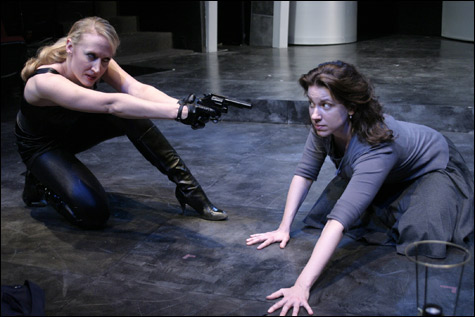
LET IT RING! Liz Hayes’s Jean (right) gets up close and personal with Jessica D. Turner’s Other Woman. |
Usually when a cell phone goes off in the theater, you want to kill someone. In the case of Dead Man’s Cell Phone (at the Lyric Stage Company through November 14), that’s not necessary. The timid protagonist of Sarah Ruhl’s surreal comedy of love, loss, and the random utterances that haunt the universe is sipping her solitary soup in an Edward Hopper–esque café when a neighboring diner’s device starts to ring and ring and ring. She is bemused and then irritated, but Gordon is neither obtuse nor deaf, just dead. Oddly touched, our heroine takes stewardship of his phone — and of his life, which turns out to be a tangle of dysfunctional and somewhat sinister business over which, by lying to relatives and even engaging in some fantasy cloak-and-dagger, she endeavors to spread a dew of comfort and correction.
This fanciful play by the MacArthur-grant-winning author of Eurydice and The Clean House debuted Off Broadway last year in a production that starred Mary Louise Parker. Aswim in nonchalance and wonder in a Boston premiere directed by Carmel O’Reilly and plopped into a skewed, modernist locale by set designer Cristina Todesco, the play’s as whimsical as Ogden Nash on a sidewalk Sprint, yet anchored to earth by troubling themes and forlorn, pressing questions. As the departed Gordon’s mom, Mrs. Gottlieb, observes in answer to the lugubrious swell of Rodgers & Hammerstein’s “You’ll Never Walk Alone” at the funeral: how can you when “there’s always a machine in your pants that might ring?” And as Jean, the self-appointed caretaker of the dead man’s pocket link to the world, muses: when everyone is on a cell phone, it is impossible to disappear and equally impossible to be fully present. “Memory,” declares Gordon’s nebbishy brother, Dwight, who bonds with Jean over a love of embossed stationery, “requires paper.”
Memory is also a concern of The Clean House, at the center of which is a scouring-averse maid who endeavors to commemorate her deceased South American parents by crafting the perfect joke, and of Eurydice, a piquant gloss on the Orpheus myth in which the title character, though ushered into Hades by her dead dad, finds herself increasingly unmoored from human memory — and that includes memories of him. Dead Man’s Cell Phone feels more arbitrary, as opposed to magically realistic, than either of those works. Neither is it given to as many flights of loopy lyricism. But it clearly stems from the same Paula Vogel–imprinted fey yet mysterious sensibility (enhanced here by the bells and whispers of Dewey Dellay’s ringing, otherworldly sound design). And O’Reilly’s production keeps the fragile comedy’s mock and sorrowful elements in balance, not allowing it to slip its emotional hold and topple over into cuteness.